Navigating the multitude of recommendations and advice when it comes to an infant’s health can be overwhelming. Among the most critical aspect is water consumption, specifically the use of purified water. Although purified water is free from harmful substances such as bacteria, viruses, contaminants, and unwanted minerals, its suitability for use when it comes to infants is still a subject of extended discussions. Adequate water intake supports numerous functions such as temperature regulation, digestion, waste elimination, and nutrient absorption in infants, making it an essential component in their overall growth and development.
In this blog, we delve into the various purification methods of water such as distillation, reverse osmosis, deionization, UV treatment, and activated carbon filtration, and analyze their effectiveness in ensuring its safety for consumption. Additionally, we will examine the role of water in brain development, detoxification, and its crucial role in preparing infant formula and introducing solid foods in an infant’s diet. With the myriad of water types available including tap, bottled, filtered, and purified water, finding the safest and healthiest option for your infant can be daunting. We will provide an in-depth understanding of these variants and also discuss alternative water choices that may be suitable for the little one.
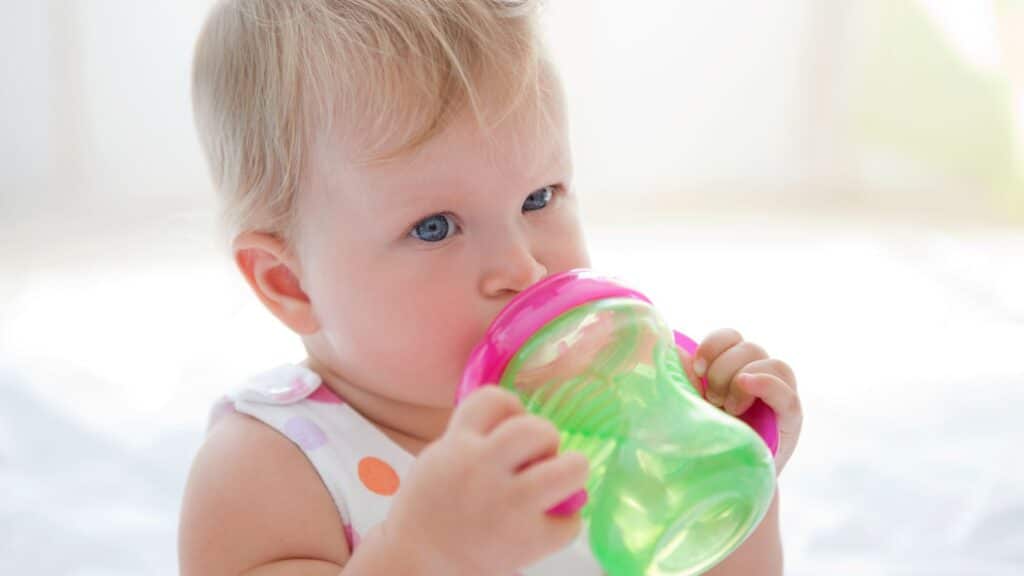
Understanding Purified Water
Purified water is water that has been processed to remove impurities, contaminants, and unwanted minerals. This type of water is free from chemicals, bacteria, viruses, and other harmful substances, making it safe for consumption and industrial applications.
Several methods used to purify water, including:
Distillation:
This process involves boiling water, collecting the steam, and condensing back into the water. Contaminants with higher boiling points are left behind, resulting in purified water.
Reverse Osmosis:
In this method, water is forced through a semipermeable membrane with small pores that only allow water molecules to pass through. Contaminants and dissolved solids are left behind, producing purified water.
Deionization:
This process involves the removal of ions from water using ion exchange resins. Positively and negatively charged ions are replaced with hydrogen and hydroxyl ions, resulting in purified water.
UV Treatment:
Ultraviolet (UV) light is used to disinfect water by destroying the DNA of bacteria, viruses, and other microorganisms. This method is often used in combination with other purification techniques.
Activated Carbon Filtration:
This method uses activated carbon to remove contaminants through adsorption. As water passes through the activated carbon filter, impurities are trapped and removed, leaving purified water.
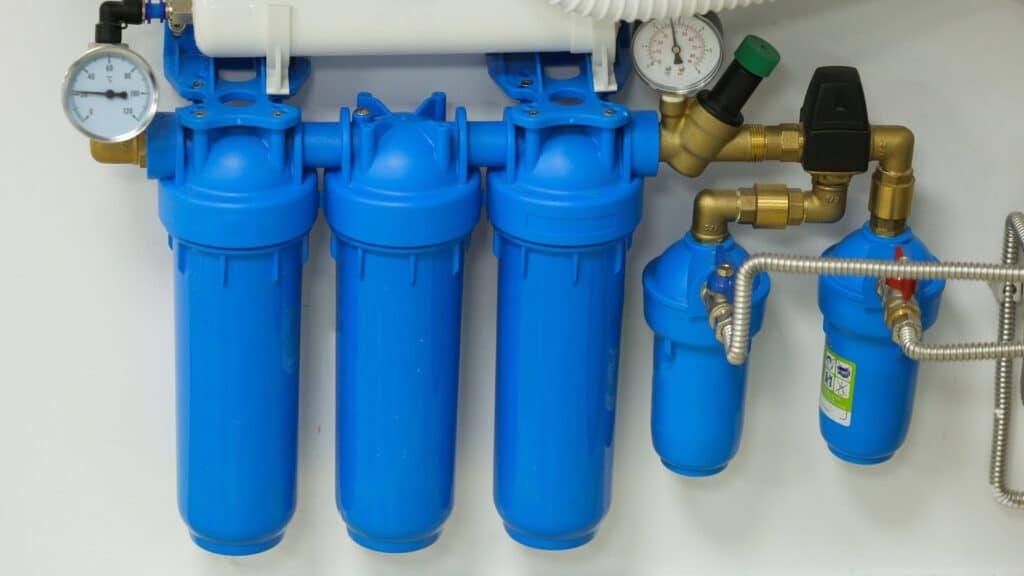
The Importance of Water for Infants
Water is crucial for every human being, but it is especially important for infants due to the following reasons:
- Hydration: Just like adults, infants need water to stay hydrated. Since their bodies are smaller, they can quickly become dehydrated than adults. Proper hydration helps maintain body temperature, supports digestion, and aids in waste elimination.
- Nutrient absorption: Water is essential for absorbing nutrients from infants’ food. Adequate water intake ensures that the nutrients are effectively transported to the cells, promoting healthy growth and development.
- Digestion: Water plays a crucial role in breaking down food in the stomach, which aids in digestion. It also helps prevent constipation by softening stools and maintaining regular bowel movements.
- Brain development: A significant portion of an infant’s brain is composed of water. Staying hydrated is essential for optimal brain function, cognitive development, and overall growth.
- Detoxification: Water helps flush out toxins and waste products from the body, keeping infants healthy and reducing the risk of illness.
When it comes to preparing infant formula and introducing solid foods, water plays a vital role:
- Water for formula: When mixing infant formula, it is essential to use clean, safe water, such as purified, distilled, or boiled and cooled tap water. Following the formula manufacturer’s instructions for the correct water-to-powder ratio is crucial to ensure proper nutrition and hydration for your baby.
- Breast milk: For breastfed infants, breast milk provides all the necessary hydration and nutrients for the first six months of life. There is typically no need to supplement with water unless a healthcare professional advises.
- Introducing solid food: As you introduce solid foods to your baby around six months of age, you can also start offering small sips of water to help with digestion and hydration. Be cautious not to replace breast milk or formula with water, as it does not provide the necessary nutrients for growth and development.
- Fruit juice: While it can provide some hydration, it is not a substitute for water and should be offered in moderation due to its high sugar content. The American Academy of Pediatrics recommends avoiding fruit juice for babies under 12 months of age.
Water is essential for infants’ overall health and development. Ensuring proper water intake while preparing infant formula, breastfeeding, and introducing solid foods will help support your baby’s growth and well-being.
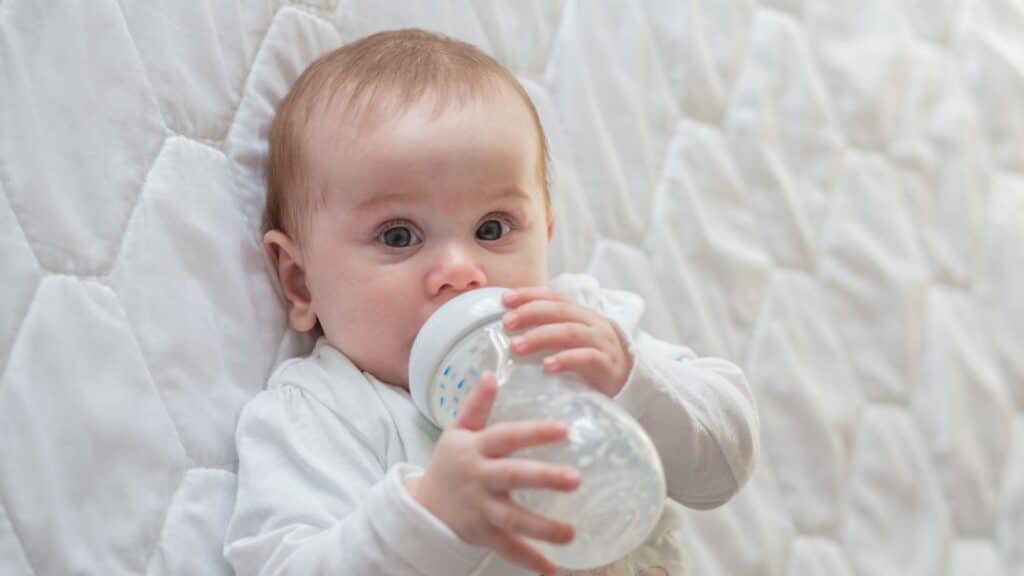
Benefits of Purified Water
Provides Nourishment
Although drinking water may seem plain, it contains essential minerals the body needs. Even more, it also helps with regulating body temperature while hosting one’s metabolism at the same time. Parents need to encourage their children to drink purified water during breaks. Once they’re over six months, you can start introducing purified drinking water now and then.
Averts Constipation
Constipation is a common problem, especially for babies. One of the primary reasons it happens is the lack of drinking water. It usually occurs when waste travels through the digestive tract too slowly, causing the stool to lose its liquid and turn dry and hard. Providing your baby access to drinking purified water can help reduce the chances of developing constipation at a young age.
Boosts Brain Function
Your baby undergoes a lot of changes as they grow. Besides breast milk and infant formula, purified water can help boost your child’s attention span and retention capacity. These factors are essential to support their growth spurt further as they age.
Supplies Proper Hydration
Your baby needs to have a constant supply of purified water as they grow. With all their activities, keeping them hydrated gives them the energy they need to replenish the lost fluid. Water hydrates tired muscles, repairing them overnight as the human body rests. Keeping bottled water handy is crucial so that your babies won’t run out of purified water to drink, especially when you’re outside.
Shields Them From Water-Borne Diseases
Lastly, drinking purified water helps protect your baby from biological pathogens and other harmful contaminants. Remember that kids are more prone to microbes that may cause adverse health effects than adults. Providing them access to purified water can help reduce their chances of exposure to diseases such as lead poisoning and cholera.
Primary Water Sources When Making Baby Formula
When making infant formula, it’s crucial to consider the water source you’re using. Here are the different options:
Tap Water
- It’s convenient and usually safe in many developed areas.
- However, it may contain chlorine, lead, and other contaminants that could be harmful to your baby.
- Consider getting your tap water tested and treated if necessary.
- Some parents choose to boil tap water before mixing it with infant formula to kill any bacteria present.
Bottled Water
- This option is convenient and typically safe.
- Be aware that not all bottled water is created equal. Some types may contain high levels of sodium or sulfate, unsuitable for babies.
- Additionally, most bottled water is not fluoridated.
Fluoridated Water
- Fluoride is a mineral that helps prevent tooth decay.
- It’s important for your baby’s dental health, but too much can lead to a condition called fluorosis.
- Some tap water is fluoridated. If yours isn’t, or if you rely on bottled water, discuss fluoride supplements with your pediatrician.
Distilled Water
- Often considered the safest water for baby formula as the distillation process removes impurities and contaminants.
- However, like bottled water, distilled water lacks fluoride.
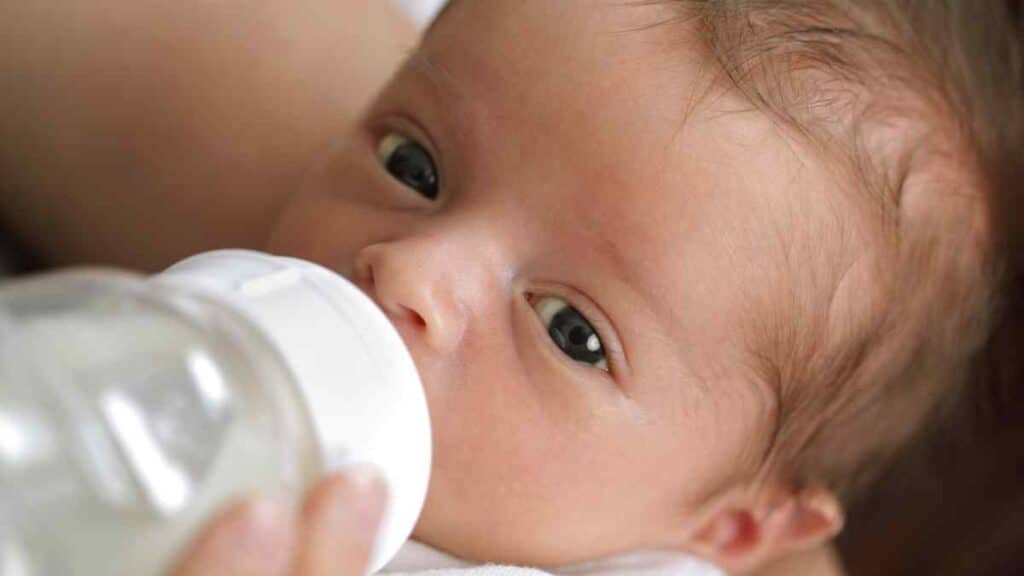
Purified or Distilled Water
- Many parents prefer purified or distilled water to mix with infant formula.
- This option ensures that the water used is free of harmful contaminants.
Baby Water
- This is a specialized type of bottled water available in stores.
- It’s typically purified and may be fortified with minerals, such as fluoride.
- However, it’s usually more expensive than other options.
Ensuring Safe and Clean Water for Infants
To protect your baby’s health, providing them with safe and clean water is crucial, especially when you prepare infant formula or mix infant formula. Here are some tips to ensure the water your infant consumes is safe:
Boil water:
Boiling water is one of the most effective ways to kill bacteria, viruses, and parasites that may be present in tap water. Be sure to let the water cool before giving it to your baby.
Use a water filter:
A good quality filter can remove contaminants such as lead, chlorine, and other harmful substances. Make sure to change the filter regularly, as recommended by the manufacturer.
Bottled water:
If you need clarification on tap water quality, you can use bottled water for your baby. However, be cautious of the source and ensure it is from a reputable company.
Test your water:
If you have concerns about tap water, consider having it tested for contaminants. Local health departments or certified laboratories can provide water testing services.
Store water safely:
Always store water in a clean and covered container, away from direct sunlight and potential contaminants.
You can support your baby’s healthy growth and development by understanding the importance of water for infants and ensuring they have access to safe, clean water when preparing their infant formula or baby formula.

The Pros of Purified Water
Here are the various advantages of using purified water for babies. These benefits include its purity, absence of impurities and the fact that it does not contain harmful chemicals.
- Purity: Purified water undergoes a thorough filtration process, which removes contaminants, bacteria, and other impurities. This ensures the water is clean and safe for consumption, making it an ideal choice for babies with sensitive immune systems.
- Lack of Impurities: As mentioned earlier, purified water is free from impurities such as heavy metals, chlorine, and pesticides. These substances can harm babies, especially when consumed in large quantities. By using purified water, parents can have peace of mind knowing that their baby is not ingesting these harmful substances.
- No Harmful Chemicals: Purified water does not contain harmful chemicals that may be present in tap water or other drinking water sources. For instance, fluoride, commonly added to tap water, can cause dental fluorosis in young children if consumed excessively. Purified water, on the other hand, is free from such chemicals, making it a safer option for babies.
The Cons of Purified Water
Here are some potential drawbacks of using purified water for babies, such as the potential lack of beneficial minerals, the cost, and the environmental impact.
- Lack of Beneficial Minerals: Purified water undergoes a process that removes contaminants and beneficial minerals such as calcium, magnesium, and potassium. These minerals are essential for the growth and development of babies. Using purified water for babies could lead to a deficiency of these essential minerals in their diet.
- Cost: Purified water can be more expensive than tap water or other water sources. If you choose to use purified water for your baby, you might spend more money on water than you would if you used tap water or other water sources.
- Environmental Impact: The process of purifying water can be energy-intensive, and the production of plastic bottles for purified water also has a significant environmental impact. If you are concerned about your carbon footprint and the impact of plastic waste on the environment, using purified water for your baby might not be the best choice.
- Potential Contamination: Although purified water is treated to remove contaminants, there is still a risk of contamination during bottling or if the water is not stored properly. This could expose your baby to harmful substances.
It’s important to weigh these factors and decide based on your baby’s needs and preferences.

Alternative Water Choices for Babies
Here are the various types of water that may be safe and healthy for babies, including tap water, bottled water, and spring water.
Tap Water
Tap water is the most accessible and cost-effective option for providing water to your baby. Tap water is treated and disinfected by local water treatment facilities to meet government standards. However, it may still contain some contaminants and minerals affecting taste and quality. Many communities add fluoride to their water supply to promote dental health. While fluoridated water offers dental benefits, it is not as purified as purified or distilled water.
Bottled Water
Bottled water is popular for many parents due to its convenience and perceived purity. However, not all bottled water is created equal, and choosing a brand with low mineral content, specifically low levels of sodium and fluoride, is essential.
Low Fluoride Bottled Water
Low-fluoride bottled water is a great alternative to tap water, as it undergoes a thorough filtration process, ensuring it is clean and safe for consumption. This type of water is ideal for babies with sensitive immune systems and when preparing a baby’s formula.
Tips for Choosing Safe Water for Babies
In this final section, we’ll offer practical tips and recommendations for parents and caregivers on choosing safe and healthy water for babies, regardless of the type they choose.
Avoid tap water:
Tap water may contain contaminants and bacteria that could harm your baby. If you must use tap water, boil it for at least one minute to kill bacteria or viruses.
Choose bottled water with care:
When selecting bottled water, look for brands tested and certified for low levels of contaminants. Avoid using mineral water, as it may contain high levels of minerals unsuitable for babies.
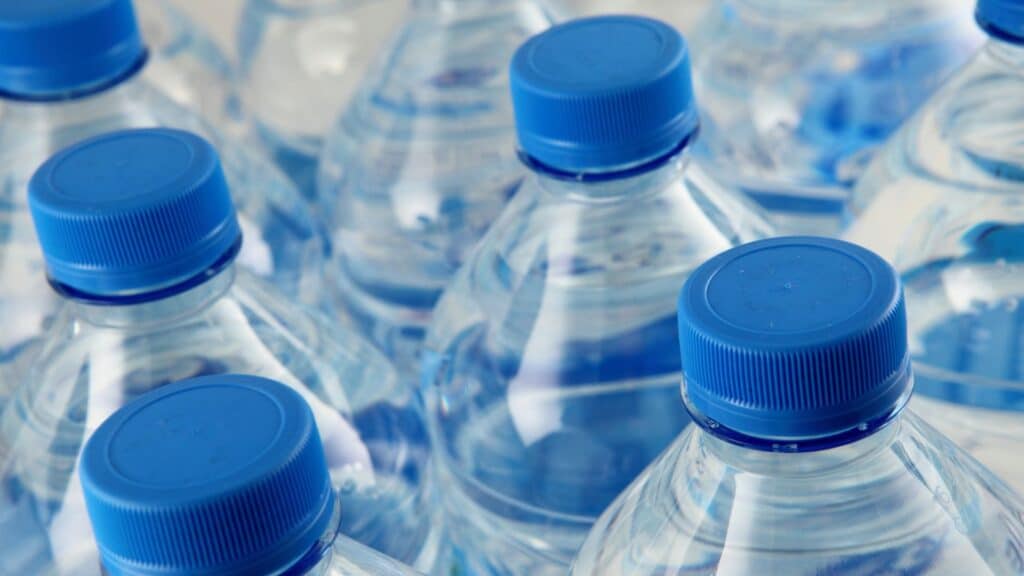
Consider using purified or filtered water:
Purified or filtered water has gone through a process to remove contaminants and impurities. This type of water is generally safe for babies, but always check the label to ensure it meets safety standards.
Boil water for mixing with the formula:
If you use powdered formula, always boil the water you plan to mix with the formula for at least one minute. This will help to kill any bacteria or viruses that may be present.
Store water properly:
Store water in a clean, airtight container and keep it in a cool, dark place. Use the water within a few days to ensure it remains fresh and safe for your baby.
Check the water source:
If you need clarification on the safety of your water source, have it tested by a professional. This is particularly important if you use well water, as it may contain harmful contaminants.
Consult with your pediatrician:
If you have concerns about the water you are using for your baby, consult with your pediatrician. They can guide the best type of water for your baby’s needs.

Crucial Aspects to Determine Water Quality
Appearance: Always remember that clean drinking water should be clear and transparent. So if you notice any signs of cloudiness, then it’s best not to drink the water until you’re sure. In most cases, clouder water is a sign of contamination with potentially harmful chemicals.
Texture: Another way to tell if you have potable drinking water is its quality. Although you wouldn’t have any problems with texture when drinking bottled water, there are times when water can feel slimy, especially when it has certain chemicals present such as manganese and lead.
Color: If your color contains any color, it’s also a clear indication that there might be something in the water that may cause adverse effects on your health. So, unless you mix it with something, such as milk formula, it’s best to stay away from it as much as possible.
Smell: Besides the smell and the color, you should also look for foul or unusual odors. For instance, water contaminated with bleach produces a funky smell that resembles chemicals.
Should You Have Your Water Tested?
If you notice anything unusual with the water, then it’s best to have your water tested. Most water systems regularly test for lead as part of their water monitoring routine. It’s highly advisable to test your drinking water, especially if it isn’t coming from a public water system. For this reason, performing routine testing is crucial to determine if it contains any potentially harmful contaminants.
You may test the tap water yearly to check for coliform bacteria or nitrates. You may also check the pH levels or dissolved solids, especially if you’re using underground water. Meanwhile, pregnant women should also test the water for traces of nitrate, especially during the early months of their pregnancy.
EPA has a Drinking Water Watch Program that enables you to access the system using its database to determine if there are any water quality violations in the area. You can also access any reported cases of health hazards and the actions the state took to improve water quality.
Lastly, you can also test your water supply for chemical contaminants if there are any chemical or fuel spills near your water supply. Doing so will help you learn if there are any potential impurities in your supply.
Your local health department will perform a series of tests to check for potential bacterial or chemical contamination. If not, you can request a state-certified laboratory to test your water supply.
Almost every testing laboratory uses state-of-the-art equipment to collect, preserve, and handle water samples. Since a few specific procedures need the water to run for several minutes before taking a few samples, a trained technician will be with you to analyze them directly in your home.
Conclusion
Ensuring babies access safe and clean water is crucial for their health and development. Purified water presents numerous advantages, such as its high level of purity, lack of impurities, and the absence of harmful chemicals.
This is achieved through an extensive filtration process, effectively removing contaminants, making it a superior choice to other water types.
Nonetheless, purified water may have certain drawbacks, including eliminating essential minerals and a potentially higher cost.
Parents need to comprehend the various types of water and their respective purification methods to make well-informed decisions about the water they provide for their babies. Parents can foster their child’s healthy growth and development by taking the necessary precautions to guarantee access to safe, clean water.
Hey, did you have any questions? Let us know! We’d love to hear from you.



